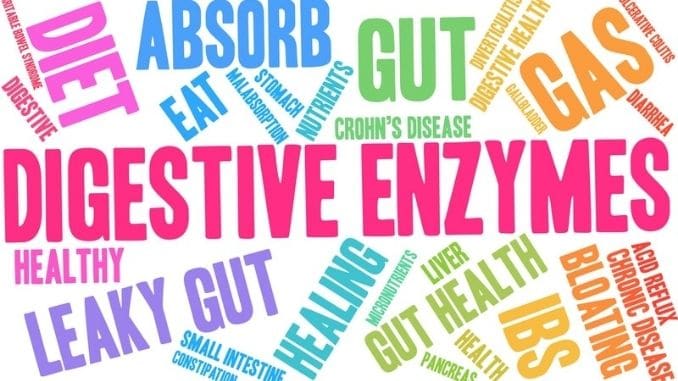
You’ve just finished a delicious meal, and there goes your stomach again: gas, bloating, discomfort and, later on, diarrhea or constipation. You wonder if you ate something wrong. Then, a few days later, it happens again. In fact, it happens so frequently that you think maybe you’re just getting older or maybe something else is going on that’s more serious.
Then, you read about digestive enzymes. Moreover, the article says that the body’s supply of these enzymes naturally dwindles with age.
Could that be it, you wonder? Should you be taking digestive enzyme supplements?
What Are Digestive Enzymes?
You already have digestive enzymes in your body. These are special proteins the digestive system uses to help break down the foods you eat into smaller components like amino acids, fatty acids, cholesterol and simple sugars as well as vitamins, minerals and phytochemicals. Once the food is broken down, your cells can then absorb the nutrients and use them for various purposes.
Moreover, every time you eat or even anticipate eating, the body secretes different enzymes from different parts of the body:
- The mouth produces lipase, amylase and lysozyme
- The stomach produces pepsin (the main one) and lipase
- The pancreas produces a juice that is made up of digestive enzymes, including trypsinogen, chymotrypsinogen, carboxypeptidase, elastases, lipase and amylase
- The small intestine produces erepsin, maltase, lactase, sucrase and others
In general, the powerhouse enzymes in the body come from the pancreas, which then sends them to the small intestine to do their work. These include:
- Lipase: Breaks down fats
- Amylase: Breaks down carbohydrates
- Proteases and peptidases: Break down proteins; include pepsin, trypsin, chymotrypsin and carboxypeptidase A and B
Other key enzymes that are critical to digestion include:
- Lactase: Breaks down lactose and is found in dairy products
- Maltase: Breaks down maltose (malt sugar)
- Sucrase: Breaks down sucrose into simpler sugars
Furthermore, you can see that each type of enzyme has a particular job to do—some break down certain types of foods, and some break down other types. Once the foods are broken down into nutrients, these nutrients are absorbed into the wall of the small intestine, and then they move into the bloodstream. The blood then takes the nutrients throughout the body and delivers it to the cells that need it.
Moreover, in healthy people, these enzymes do the work of breaking down foods into their smaller components, and everything works as it should.
What Happens When Digestive Enzymes Don’t Work Properly?
If you don’t have enough digestive enzymes in the body, however, or if those enzymes aren’t working properly, you may develop uncomfortable symptoms that over time, can lead to serious health issues:
- Gas and bloating
- Acid reflux (heartburn)
- Frequent diarrhea/constipation
- Stomach pain/upset stomach
- Lack of energy/lethargy
- Weight loss
- Chronic digestive problems
- A feeling the food is sitting in the stomach (like a rock)
- Irritable bowel syndrome (IBS)
- Specific food cravings
- Malnourishment
Some pre-existing conditions can cause enzyme insufficiencies:
- Lactose intolerance
- Celiac disease
- Inflammatory bowel disease
- Pancreatitis
- Cystic fibrosis
- Pancreatic cancer
- Gallbladder removal
If you have any of the above conditions, and you’re experiencing symptoms of enzyme insufficiency, talk to your doctor. He or she can work with you to determine if enzyme supplements may be helpful for you and, if so, which ones will work best.
What Are Digestive Enzyme Supplements?
Digestive enzyme supplements are enzymes in pill form that are meant to replace missing enzymes in the body. They may be purchased over-the-counter or received from a medical doctor via a prescription.
Research on digestive enzymes is still new, but we do have some studies showing that they can be helpful in addressing certain types of diseases. In a 2016 review, for example, researchers reported that digestive supplements “may play a role in the management of digestive disorders, from lactose intolerance to cystic fibrosis.”
Moreover, in a 2013 interview with enzyme expert M. Mamadou, Ph.D., published in the Natural Medicine Journal, Dr. Mamadou noted that supplemental digestive enzymes can be very helpful in alleviating pancreatic insufficiency, lactose intolerance, casein and gluten intolerance, food allergies and celiac disease.
However, what if you don’t have any of these diseases or conditions, but you are still suffering from digestive symptoms?
Doctors Question Whether Digestive Enzymes Help Common Issues
During the past decade or so, digestive enzyme supplements have become more popular. Moreover, there are many products available on the market today, and manufacturers like to boast about how much these supplements can help you.
Doctors aren’t so sure, however. Moreover, in an article published in the Mayo Clinic Proceedings in 2014, the authors expressed concern over the surge in digestive enzyme use and the “numerous health benefit claims by manufacturers … .” They also stated “the quality of dietary supplements has been a cause for concern … ,” and noted that “enzyme production does not inherently decrease with age.”
Then, they discussed the question of whether digestive enzyme supplements can help people without specific health conditions, but who experience symptoms like gas and bloating. One study, for example, found that participants given enzyme supplements containing lipase, protease and amylase, before and after a fatty meal reported significantly less gas, bloating and fullness than those who didn’t take the supplements. The supplement used was a prescription supplement; however, not an over-the-counter one.
The authors concluded, however, that while enzymes are “intriguing” and may have a number of health benefits for digestion and other issues like pain and inflammation, current evidence “does not permit endorsement of the use of supplemental enzymes to treat common gastrointestinal tract symptoms, such as bloating, gas and irritable bowel syndrome.”
moreover, that means your medical doctor is unlikely to be open to the idea of using digestive enzymes except in cases of specific health issues. Many alternative practitioners, however, do believe they can be helpful in some cases.
Is There Any Risk to Taking Enzyme Supplements?
Because the United States Food and Drug Administration (FDA) does not regulate over-the-counter supplements, consumers must be cautious. You have only the manufacturer to trust that the product contains the exact amounts of enzymes listed on the label. Prescription enzymes are subject to a more thorough type of testing.
Short-term use of these enzymes is not likely to harm you. However, there is little research on long-term effects. If you want to try over-the-counter digestive enzymes to help relieve digestive symptoms, most health experts agree that you can do so without worry of serious risks.
Be aware that digestive enzyme supplements can cause side effects in some people. These may include problems similar to those the supplements are supposed to help relieve:
- Stomach pain/upset stomach
- Gas and bloating
- Coughing
- Headache
- Diarrhea and constipation
- Heartburn
- Allergic reactions
The other thing is to do your research — choose supplements from companies that have good reputations and that are likely to be quality supplements that you can feel good about.
Below are some of the most common digestive enzymes used to help ease symptoms:
- Lactase: Those who are lactose intolerant can find relief of symptoms by taking lactase, which helps digest dairy products.
- Bromelain: This enzyme comes from pineapple and is available alone and in combination with other enzymes. It may have antiplatelet activity, however, which means it can reduce clotting. If you’re already taking a blood thinner or if you’re at risk for bleeding, you should avoid this enzyme.
- Alpha-galactosidase: This enzyme helps break down starches from legumes and can help reduce gas and bloating after eating foods like beans and hummus. Over-the-counter products (like Beano) containing this enzyme are made specifically for people who have trouble digesting these foods. If you have extremely bad gas after eating a small amount of these foods, this enzyme may be helpful. Vegetarians and vegans who rely heavily on beans for their diet may also be good candidates for this enzyme.
- Amylase: This enzyme is needed to break down starches from bread, rice and other carbohydrates. If these foods cause symptoms for you, the enzyme might help.
- Pectinase: If apples just don’t agree with you, this may be the enzyme you need. Pectin is found in certain fruits like apples, pears, oranges and plums.
- Cellulase: This enzyme breaks down cellulose, which is found in fiber-rich foods like plants, fruits, grains and seeds. If you have trouble with broccoli, asparagus and beans, you may be low on this enzyme. You need fiber for good health, so if you’re increasing your intake and you notice bloating, gas and other digestive issues, it could be that a cellulase enzyme would help.
- Peptidase: If you struggle to digest gluten or milk products, try this enzyme. If you feel like you are gluten-intolerant, use this enzyme first before eliminating all gluten from your diet. It may solve your problem.
- Glucoamylase: If sugar causes you digestive troubles, think about a glucoamylase enzyme supplement. Remember that refined grains like white rice and white bread also contain sugar and may cause digestive distress.
- Invertase: This enzyme helps break down a type of sugar called “sucrose.” This sugar is naturally present in foods like peaches, dates, sweet peas and mangos. It’s also present in cookies, pancakes, dark chocolate and some commercial cereals.
- Lipase: This enzyme breaks down the fats you eat, so if you’re having trouble after eating a fatty meal, you could be low on this enzyme. Keep in mind, however, that high-fat meals can be difficult to digest anyway and aren’t usually healthy.
- Protease: Do you have trouble with high-protein foods like eggs, meats and nuts? If so, you may be lacking protease.
- Xylanase: If you often eat a lot of raw vegetables and fruits, and you have digestive symptoms afterward, this enzyme may help. It assists in breaking down plant fibers.
For recipes to help with your digestive health, make sure to check out the Digestive Health Cookbook, here!






